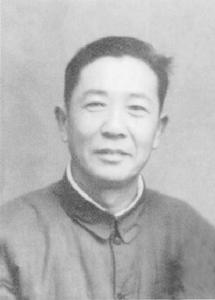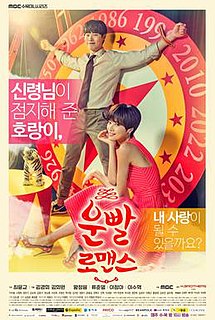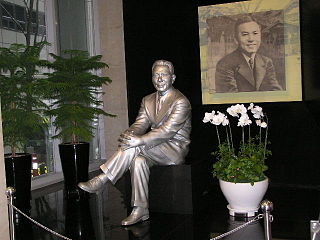
South Korea competed as Korea at the 1996 Summer Olympics in Atlanta, United States. 300 competitors, 189 men and 111 women, took part in 160 events in 25 sports.

Seoul Institute of the Arts (SeoulArts) is a South Korean arts university founded by Yoo Chi-Jin in 1962. The Ansan Campus was completed in February 2001 and is the designated centre of arts education, whilst the Namsan Campus is the center of art experience. SIA has 2400 students in 13 departments. It offers a three-year associate degree program as well as a four-year program for a bachelor's degree. The incumbent president of the university is Yoo Duk-Hyung.

East of Eden is a 2008 South Korean television series, starring Song Seung-heon, Yeon Jung-hoon, Park Hae-jin, Han Ji-hye, Lee Da-hae and Lee Yeon-hee. It was produced by Chorokbaem Media as a 47th Anniversary Special Project Drama for MBC, on which it aired from August 25, 2008 to March 10, 2009 on Mondays and Tuesdays at 21:55 for 56 episodes. The ₩25 billion drama tells the story of the brothers Dong-chul (Song) and Dong-wook (Yeon). Their fates diverge after the murder of their coal miner father, with one joining the mob and the other becoming a successful lawyer.

On Air (Korean: 온에어) is a 2008 South Korean television series, starring Kim Ha-neul, Park Yong-ha, Lee Beom-soo and Song Yoon-ah. The series is a behind-the-scenes look at a fictional television drama, revealing details about what normally goes on behind a TV drama production. It aired on SBS from March 5 to May 15, 2008 on Wednesdays and Thursdays at 21:55 for 21 episodes.

Korean ethnic nationalism, or racial nationalism, is a political ideology and a form of ethnic identity that is widely prevalent in modern North and South Korea. It is based on the belief that Koreans form a nation, a "race", and an ethnic group that shares a unified bloodline and a distinct culture. It is centered on the notion of the minjok, a term that had been coined in Imperial Japan ("minzoku") in the early Meiji period on the basis of Social Darwinian conceptions. Minjok has been translated as "nation", "people", "ethnic group", "race", and "race-nation".
The sprouts of capitalism, seeds of capitalism or capitalist sprouts are features of the economy of the late Ming and early Qing dynasties that mainland Chinese historians have seen as resembling developments in pre-industrial Europe, and as precursors of a hypothetical indigenous development of industrial capitalism. Korean nationalist historiography has also adopted the idea. In China the sprouts theory was denounced during the Cultural Revolution, but saw renewed interest after the economy began to grow rapidly in the 1980s.
The John Whitney Hall Book Prize has been awarded annually since 1994 by the Association for Asian Studies (AAS). Pioneer Japanese studies scholar John Whitney Hall is commemorated in the name of this prize.

Korean nationalist historiography is a way of writing Korean history that centers on the Korean minjok, an ethnically or racially defined Korean nation. This kind of historiography emerged in the early twentieth century among Korean intellectuals who wanted to foster national consciousness to achieve Korean independence from Japanese domination. Its first proponent was journalist and independence activist Shin Chaeho (1880–1936). In his polemical New Reading of History, which was published in 1908 three years after Korea became a Japanese protectorate, Shin proclaimed that Korean history was the history of the Korean minjok, a distinct race descended from the god Dangun that had once controlled not only the Korean peninsula but also large parts of Manchuria. Nationalist historians made expansive claims to the territory of these ancient "Korean" kingdoms, by which the present state of the minjok was to be judged.

Inspiring Generation is a 2014 South Korean television series starring Kim Hyun-joong, Im Soo-hyang and Jin Se-yeon. It aired on KBS2 from January 15 to April 3, 2014 on Wednesdays and Thursdays at 21:55 for 24 episodes.

KeyEast is a management agency founded by actor Bae Yong-joon.

Healer is a 2014-2015 South Korean television series starring Ji Chang-wook, Park Min-young and Yoo Ji-tae. It aired on KBS2 from December 8, 2014 to February 10, 2015 on Mondays and Tuesdays at 22:00 for 20 episodes.

Kim Hyang-gi is a South Korean actress.

Shang Yue, rendered as Sang Wol (Korean: 상월) in Korean, was a Chinese Marxist economic historian, author and professor at the School of History at Renmin University of China. Before becoming a historian, he also wrote fiction. He taught literature to Kim Il-sung for a short time at Yuwen Middle School in Manchuria. In China, he is primarily known for his work on the idea of the sprouts of capitalism: that proto-capitalism and class struggle had existed in the earlier Chinese history. His purge in 1958 foreshadowed the Chinese Cultural Revolution as his ideas on Chinese economic history conflicted with those of Mao Zedong. After his purge he continued to work on history, but stayed out of public until Mao's death in 1976. His work also gave a lasting effect in Korean nationalist historiography.

Lucky Romance is a 2016 South Korean television series based on the webtoon of the same name published in 2014 on Naver, starring Hwang Jung-eum and Ryu Jun-yeol. It aired on Wednesdays and Thursdays at 22:00 on MBC from May 25 to July 14, 2016.

The Good Wife is a South Korean television series starring Jeon Do-yeon, Yoo Ji-tae and Yoon Kye-sang. It is a Korean drama remake of the American television series of the same title which aired on CBS from 2009 to 2016. It replaced Dear My Friends and it broadcast on the cable network tvN on Fridays and Saturdays at 20:30 (KST) for 16 episodes from July 8 to August 27, 2016.

Search: WWW is a 2019 South Korean television series starring Im Soo-jung, Lee Da-hee, Jeon Hye-jin, Jang Ki-yong, Lee Jae-wook and Ji Seung-hyun. It aired on tvN from June 5 to July 25, 2019.

Hell Is Other People is a 2019 South Korean television series starring Im Si-wan and Lee Dong-wook. Based on the Naver webtoon of the same name by Kim Yong-ki, it is the second series of OCN's "Dramatic Cinema" project which combines film and drama formats. It premiered on August 31, 2019.



















